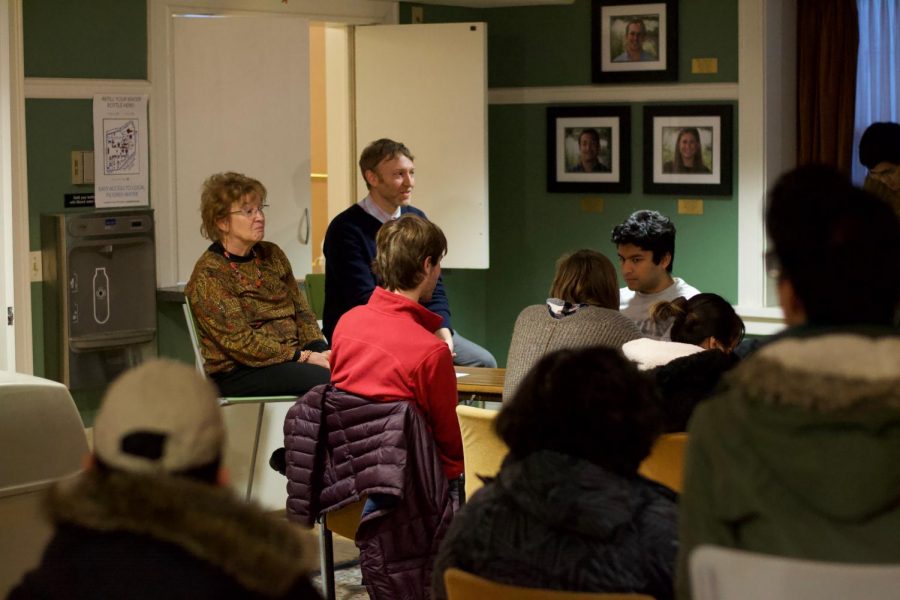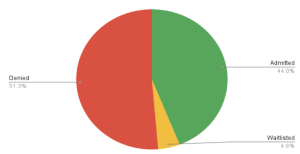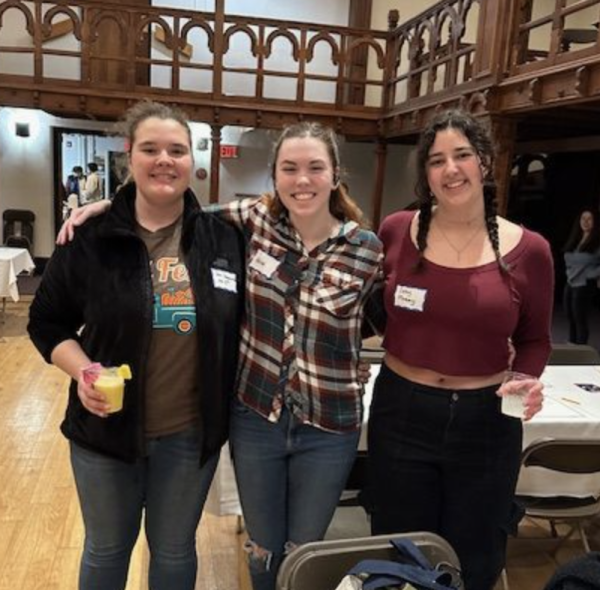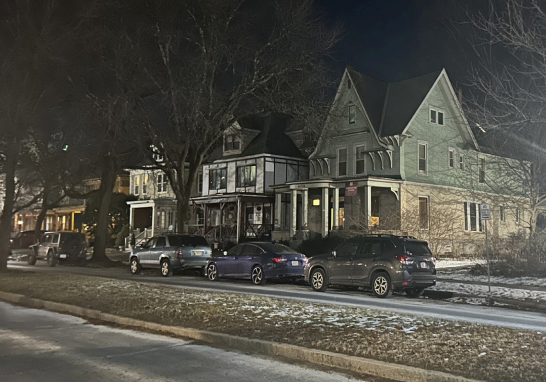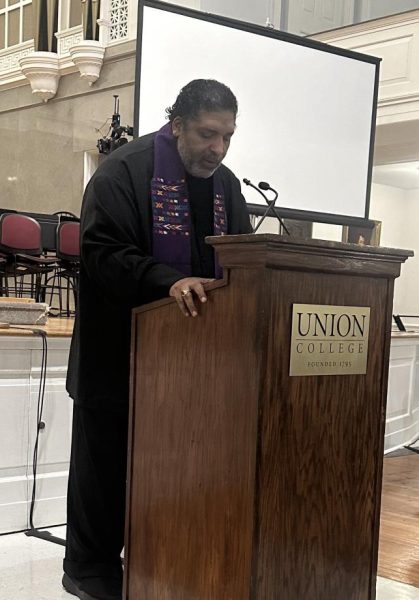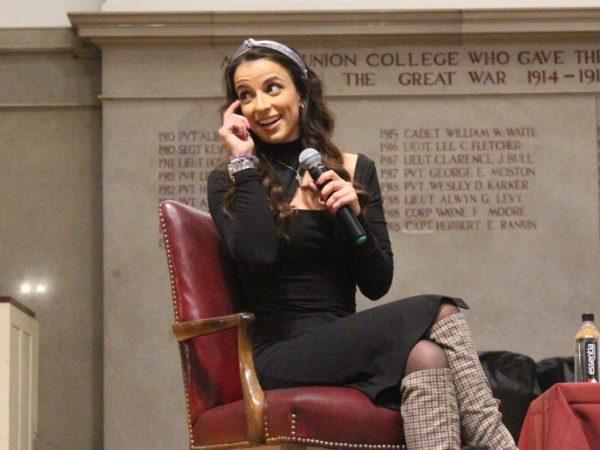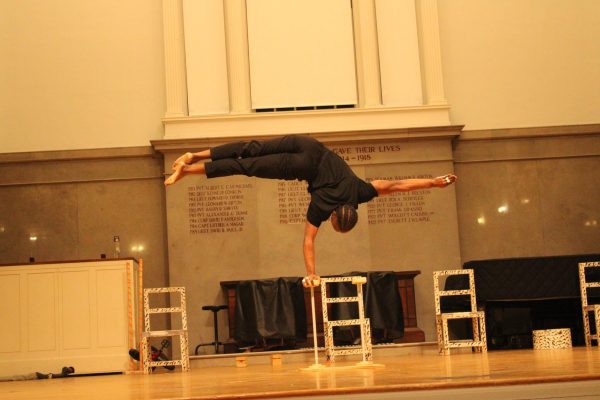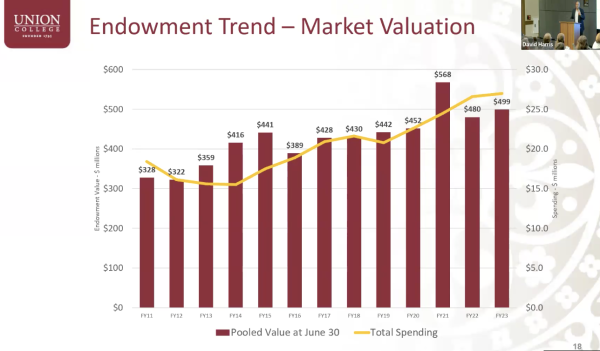Students and faculty discuss civil unrest in Venezuela
History Professor Teresa Meade and Assistant Professor of Anthropology Robert Samet lead student discussion on the civil unrest in Venezuela. Photo by Joe Maher
February 28, 2019
On Wednesday, February 20, the Latin American Student Opportunities organization (LASO) hosted a dinner and discussion on the current socio-political unrest in Venezuela in Messa House.
This event was led by History Professor Teresa Meade, who specializes in Latin American History, and Assistant Professor of Anthropology Robert Samet, who specializes in Urban Culture, Media and the Politics of Security in Latin America.
The audience was composed of students wanting to better understand the situation in Venezuela, most of whom also have an academic interest in the social sciences.
Throughout the discussion, Professor Meade gave the audience the historical context needed to understand the current crisis in Venezuela. According to her, ever since its discovery in Venezuela in the early twentieth century, oil has played a major role in Venezuelan politics. Oil companies make up roughly one third of them with, “Triumvirate of Power” in the nation, with the military and the Catholic Church making up the other two parties.
Oil companies’ influence in politics has only increased with the founding of the Organization of Petroleum Exporting Countries (OPEC) and the nationalization of oil in Venezuela. Meade argued that because oil companies hold so much power in politics, oil and the revenue from oil has always been, “a source of extreme income inequality” in Venezuela. The inflation and corruption that has resulted from this inequality has acculminated in protests and a failed coup in which the former President of Venezuela, Hugo Chavez, was a co-conspirator.
Meade went on to describe how Chavez failed at keeping his promise of relegating oil revenue to welfare programs but instead used lended money to fund them. She stated that western media’s take on Venezuela is far too simplistic, saying, “People often thought Venezuela was some sort of Garden of Eden before Chavez and Maduro, but it’s not.”
Professor Samet offered an overview of the current situation in Venezuela. He started off by characterizing the Venezuelan media as extremely diverse, having “too much freedom of expression,” with four newspaper of records and 20 newspaper in Caracas’ urban metropolitan area alone. However, Samet argued that such unchecked diversity of the media lends itself to “unimaginable polarization.”
“There’s a lot of he-said-she-said in the [Venezuelan] media,” he said. Because of such polarization, Samet argued, “Trust has been eroded between Venezuelans…there’s almost a culture of grievances in Venezuelan politics.”
Samet also talked about the current events, with the opposition coalition’s victory in the Venezuelan congress declared fraudulent by the country’s president Nicolas Maduro, who is considered by many to be a de-facto dictator. Samet remained skeptical of, “the closest thing to the right wing in Venezuelan politics.” He even drew similarities between the opposition coalition and the United States’ Freedom Caucus, saying: “these are the people who are never gonna negotiate, these are the people who are behind coups.” Samet also agree with Meade’s opinion on Western media’s coverage of this crisis: “To call this the failure of socialism is a bit fantastical… if the right to oil patrimony is socialist, then we might as well call Alaska socialist.”
Meade and Samet also agreed that foreign intervention, especially that from the United States, will only further complicate the situation. Meade also talked about the relationship between the U.S. and Latin America as a whole. She commented from how the nationalization of oil in Venezuela can be partly attributed to the fear of U.S. hegemony, to Chavez’s goal to unite Latin America against the United States’ influences, and to Maduro’s “Bolivarian Revolution.” Meanwhile, Samet talked about the current administration’s stance on the situation, saying, “It’s interesting how Trump takes on the cause of Venezuela.” He also talked about the, “weaponization of humanitarian aid,” referencing Richard Brandson’s plan for a live aid concert at the Venezuelan border and Roger Waters’ disapproval of it.
Reflecting on the event, Co-President of LASO Irving Cortez-Martinez ’19 said this event “was one of the most successful events that LASO has had for this academic year… What is going on in Venezuela is an important issue to be discussed as it affects not only Venezuela but our home countries as well.”
Sai Lyon Ho ’22, said, “Because I’m from Venezuela, I feel terrible, but at the same time lost… The discussion we had at Messa gave me the perspective from foreign people in regards to the crisis, politically and historically.”
He was also cautious of the crisis ending, saying, “There are a lot of Venezuelans saying that even if this political turmoil ends, it will be for a short period and that the crisis will go on for decades. I personally agree… but I am optimistic and more nationalistic than ever before; thus Venezuela will always be my home.”

